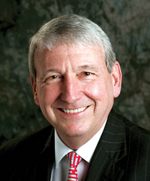Advocate for the Courts

H. Thomas Wells
Photo by Matthew Pace
Incoming ABA President H. Thomas Wells Jr. says he got the message in talks with other bar leaders over the past year or so.
There is widespread concern, he says, about “potential threats to judicial independence, and to fair and impartial courts” at the state level.
Wells and other bar leaders also have expressed frustration with the partisanship that is hampering the nomination and confirmation process for federal judges.
Wells says those issues will be among his priorities as ABA president. Wells, a shareholder in Maynard Cooper & Gale in Birmingham, Ala., will begin his one-year term in August at the close of the association’s 2008 annual meeting in New York City.
Wells has started the planning process for a conference in 2009 that will focus on how to maintain fair and impartial courts. A planning committee will be co-chaired by Justice Mark D. Martin of the North Carolina Supreme Court and Edward W. Madeira Jr. of Philadelphia, a special adviser to the ABA Standing Committee on Judicial Independence.
Meanwhile, the selection process for federal judges is on the agenda for the ABA’s policy-making House of Delegates when it convenes during the annual meeting.
The Standing Committee on Federal Judicial Improvements (along with 13 co-sponsors) is recommending the House endorse use of bipartisan commissions to consider and recommend nominees to fill vacancies in the federal district courts and the U.S. Court of Appeals. The recommendation also urges more cooperation between the president and the U.S. Senate in the judicial selection process.
The commission concept is not new. In 1977 President Carter’s executive order established a committee to assist in selecting federal judicial officers other than circuit and district court judges. That committee didn’t survive, but senators from eight states—including California, Florida and Hawaii—rely on commissions to identify district court candidates who can then be recommended to the president.
(A 1977 House resolution proposing a nominating commission for circuit court judges technically would be superseded by the recommendation that delegates will consider in New York.)
“You almost never see battles over nominees who come through the commission process,” says Wells, who asked the judicial improvements committee to develop a recommendation. But without them, he says, the process often becomes “very partisan and not very civil. I wanted to think about what we could do in efforts to tone down that process.”
Widespread use of nominating commissions wouldn’t be a cure-all for the deep-seated conflicts over selection of federal judges, says Harvey I. Saferstein, the committee member who will introduce the recommendation in the House. But, he says, “it would result in a less contentious process.”
CLIMATE CHANGE
And with a new administration assured of occupying the White House come January, now is a good time to float the commission proposal, says Saferstein, managing member of the Los Angeles office of Mintz Levin Cohn Ferris Glovsky and Popeo. “Maybe the candidates will get behind it,” he says. “Everybody with a stake in the system believes it’s breaking down and that some compromise is necessary.”
(Committee chair M. Margaret McKeown, a judge on the San Francisco-based 9th U.S. Circuit Court of Appeals, recused herself from deliberations on the recommendation.)
Another question is whether a new administration also might reconsider the ABA’s role in evaluating federal bench nominees, including those to the U.S. Supreme Court. From the 1950s until the end of the Clinton administration, the Standing Committee on Federal Judiciary vetted candidates before the president formally nominated them. In early 2001 President Bush ended that practice, although the ABA has continued to evaluate candidates once the president names them.
While not planning to press this issue, Wells says, “we’re open to any participation at whatever level will be most helpful in the selection of federal judges. We’ll be in the process, and however the new administration sees our role as most valuable, that’s where we’ll be.”



